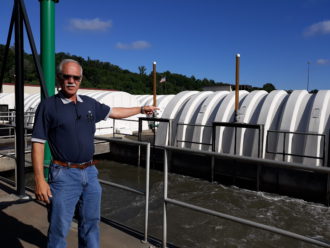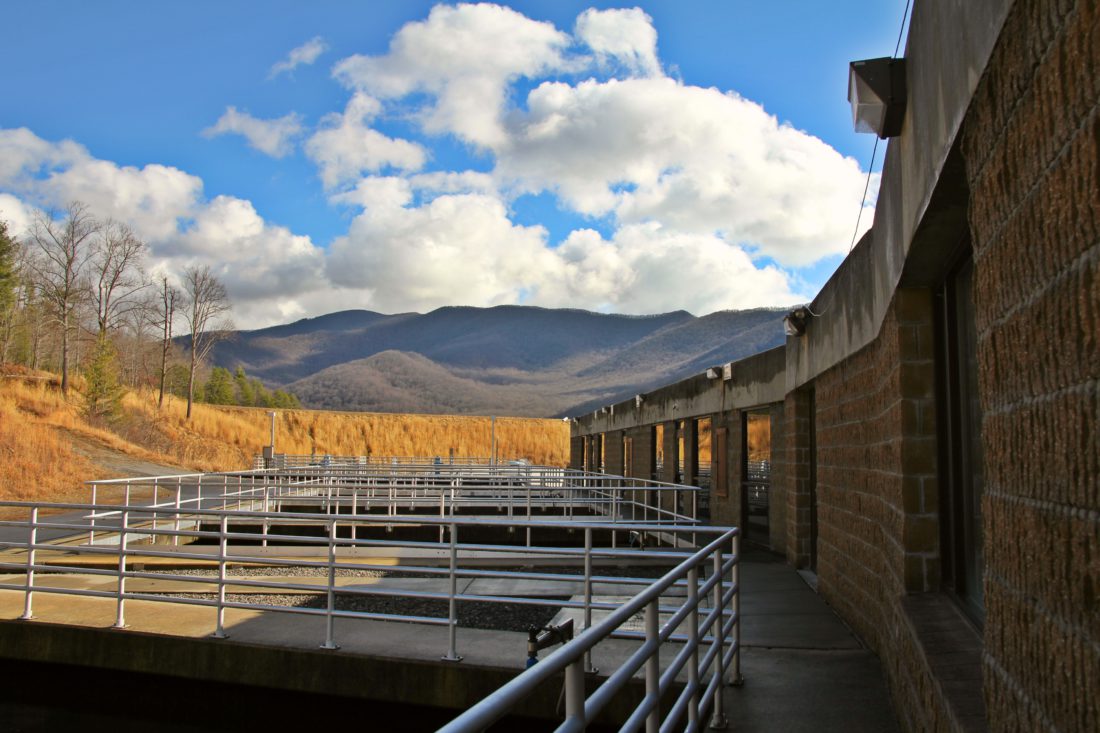A moldy half-sandwich, wilting salad remnants, a plastic takeout container holding the dregs of some mysterious variety of soup — sooner or later, most people find themselves dealing with unwanted leftovers. Asheville, however, must contend with a different kind of leftover on a far larger scale. Last year, the city’s three water treatment facilities had to handle more than 1.3 million gallons of wastes resulting from the treatment process.
Together, the North Fork, William DeBruhl and Mills River plants generated more than two Olympic-size swimming pools’ worth of sludge in the course of processing roughly 7.4 billion gallons of water last year. This byproduct is formed when the plants mix the incoming water with aluminum sulfate, which combines with the tiny particulates already present and makes it easier to filter them out.
Asheville had long outsourced the final disposal of these “residuals” to the Metropolitan Sewerage District, which operates a wastewater treatment facility in Woodfin. Last October, however, the N.C. Department of Environmental Quality placed stricter controls on what outside materials MSD could accept, thus barring the plant from taking the city’s sludge.
Asheville has since made plans to send its residuals to landfills, one in Buncombe County and one elsewhere, for up to two years. To date, however, no such shipments have been made; instead, the sludge is being kept in holding ponds at the city’s water treatment plants. And meanwhile, city officials are working on finding a more permanent arrangement. In February, City Manager Debra Campbell authorized paying over $251,000 to GHD Consulting Services to “develop an alternative solution.”
The project “is seeking ways to improve our processes, produce less residuals and find a cost-effective, long-term solution for residuals disposal for the water treatment plants,” wrote Leslie Carreiro, Asheville’s division manager for water production/water quality, in response to an Xpress records request. “GHD is investigating options and gathering data.”
Up in smoke

This isn’t the first time in recent years that the handling of Asheville’s sludge has changed. When Roger Edwards, MSD’s operations manager, first started working at the facility about six years ago, the city was dumping the material directly into the sewage system for treatment, he says. MSD then filtered out the sludge and burned it in the plant’s incinerator along with other wastewater solids — “Not a good situation,” he notes.
That’s because, when the sludge is incinerated, the aluminum sulfate it contains forms sulfuric acid, which lowers the pH of the incinerator’s emissions, Edwards explains. And that, in turn, can contribute to acid rain. Tighter federal regulations established by the Environmental Protection Agency in 2011, he says, meant that MSD would eventually be unable to burn the material. When the compliance deadline kicked in, the agency switched to holding the sludge in the plant’s on-site storage lagoon.
But MSD’s lagoon is unusual in that its discharge flows back into the wastewater treatment stream, which eventually yields solids that do end up getting incinerated. When the Department of Environmental Quality renewed the plant’s discharge permit last year, DEQ officials ordered MSD to stop accepting Asheville’s sludge.
The state agency’s decision came after “discussions with MSD and through evaluation of the current practices of accepting sludge,” DEQ spokesperson Sarah Young wrote in an email to Xpress.
Young also shared a July 12, 2018, email from DEQ officials to MSD outlining the rationale behind the new restrictions. “Using MSD as a disposal option for large volumes is not a sustainable residuals management option for the receiving facility and could potentially interfere with plant operation and functionality, depending upon the treatment technology used,” the email stated.
Limited options
For the time being, Asheville plans to take its sludge out with the trash. On May 28, City Council authorized the city manager to sign a one-year contract, with two potential one-year extensions, for Bio-Nomic Services to dispose of the residuals at the Buncombe County landfill and a Republic Services landfill in Concord.
That change of plans comes with a hefty price tag, however. The total budget for the first year is over $295,000, a significant jump from the roughly $110,000 the city spent on residuals management in 2018 (about $50,000 for Environmental Management Alternatives to haul the sludge and around $60,000 for MSD to accept it).
Much of the additional cost is due to the “dewatering” the new disposal sites require, Carreiro explains. “Previously, we would just allow the residuals to kind of thicken, and then the hauler could draw them into the tank and bring that pretty thick liquid to MSD. When we’re going to put it at the landfill, it has to be in a more solid state.”
Increased transportation costs are also a factor. The Buncombe County landfill won’t accept residuals from Asheville’s Mills River Water Treatment Plant, which is located in Henderson County. So Bio-Nomic plans to truck that sludge 137 miles across the state to Concord, which is northeast of Charlotte. The company will charge $1,330 per dry ton to handle the Mills River material, compared with $615 per dry ton for sludge from the North Fork facility.
“Quite frankly, it’s really the only option the city has open to them right now,” says Carreiro. “We can stop treating the drinking water and not produce any residuals, or we can manage our residuals.”
Covering the spread
Water Resources Director David Melton did list another option in the City Council resolution that authorized the Bio-Nomic contract: land application. In other words, applying the sludge directly on agricultural sites around the region. In a staff report accompanying the resolution, Melton wrote that the sludge “has a high nutrient value and can condition soil for improved fertilization and water retention.” The staff report went on to state that Bio-nomic will dispose of the sludge through that process.
Carreiro, however, said, “I have no idea why that is there: That is an error,” when asked about the land application language. But while Asheville has no immediate plans to pursue that approach, she clarified, the city will ask Bio-Nomic to assess it for potential future use.
According to a 2011 EPA report, land application of the specific residuals produced by Asheville’s water treatment plants might actually be environmentally detrimental. The report says that alum sludge “does not benefit the soil and is used only for filler material.” Applying this kind of sludge “can result in the adsorption of phosphorus from the soil to the applied residuals, resulting in less productive soil” and increasing heavy metal concentrations in both soil and groundwater.
Melton did not respond to a request for comment about the apparent discrepancy between his contention and the EPA report.
Young, the DEQ spokesperson, says the technique is “not uncommon” in Western North Carolina, with five facilities permitted for the process, although most in the region send their sludge to wastewater treatment plants or landfills. The DEQ monitors the levels of 25 parameters for land application, including “ignitability and corrosivity,” and tries to ensure that concentrations of heavy metals such as arsenic and mercury don’t exceed certain limits.
But Edwards of MSD says that land application faces unique challenges in WNC. The wastewater treatment plant, he points out, used to produce a Nutri-Lime sludge product as a soil amendment but stopped in 2004 after regional demand fell far short of the facility’s supply.
The area’s rugged topography, in combination with both federal and state restrictions on how close the sludge can be to wetlands, waterways and neighboring property lines, means “there’s not a whole lot of property around here that is suitable for land application,” Edwards explains. “There’s just a laundry list of reasons that land application is not suitable for MSD as a means to manage our solids.”
Meanwhile, as the city considers its next move, billions of gallons of water continue to flow through its treatment plants, where the sludge is deposited in holding lagoons.
“Managing solids is just a cost of doing business,” says Edwards. “Whether you’re treating water or you’re treating wastewater, you have got solids you’ve got to manage: It’s just the byproduct of your process.”




There is NOTHING that makes me happier than the Mountain Xpress Blessing Us With the ANNUAL: “What Do We Do With ALL THE POO” Article?
A hot summer day to get REFRESHER training! This may ruin everyones cold beer-of-choice but let’s connect the dots to new hotels being approved by the City Council and the CITY TOURISM OFFICE. Sludge is just “processed” poo. Don’t let anyone lie to you.
***
If this doesn’t CLEARLY tell you why we ALL need to fill out that SURVEY from the CITY TOURISM OFFICE and Tell them “IT’S A WASTE” of money to overpromote Our City – I guess we’ll have to agree to disagree.
***
It’s a fact, folks. We have Poo in the backyard. There is a little bit of me, a little bit of you, and a little bit of your neighbors. WE DON’T NEED a lot of visitors contributing to the poo. Debra is on-it with consultants. The Council needs to get on-it with rationale, cost-effective, proven solutions.
***
PLEASE fill out that survey. That TOURISM OFFICE lost its mind. Please remind THE COUNCIL we have poo in the backyard.
If you’d read the article, you’d realize that it’s not about “POO”. It’s about disposing of the solids that are filtered out during the process of making drinking water.
I also certainly hope you understand that the plant that makes drinking water and the plant that processes POO are two entirely different places. If you don’t know the difference; please (PLEASE) don’t fill out any surveys.